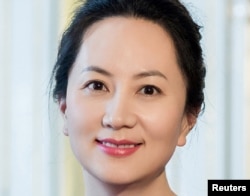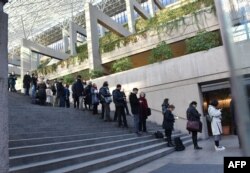A Canadian court is considering whether to grant bail to the chief financial officer for Chinese telecom giant Huawei Technologies while she awaits possible extradition to the United States to face fraud charges.
The court in Vancouver heard a second day of testimony Monday in the bail hearing for Meng Wanzhou.
Lawyers for Meng argued that she should be granted bail, saying that a combination of high-tech devices and a multi-million dollar bond could ensure she does not flee. They also said that if Meng fled the country she would embarrass China, calling that option “inconceivable.”
The lawyers said Meng would be willing to hire a surveillance company that would arrest her if she breaches her bail conditions and would wear a GPS bracelet at all times. They said Meng's husband would put up both of their Vancouver homes plus $750,000 for a total value of over $11 million as collateral.
Prosecutors have argued that Meng should be denied bail, saying she has vast resources and a strong incentive to flee.
The judge overseeing the case said the hearing would resume Tuesday morning.
An editorial Monday in the Communist Party newspaper Global Times called Canada's treatment of Meng "inhumane."
China summoned the U.S. ambassador in Beijing on Sunday to lodge a "strong protest" over Meng's arrest, calling it "extremely bad" and demanding the U.S. cancel its extradition request linked to allegations that she broke U.S. laws prohibiting trade with Iran.
Vice Foreign Minister Le Yucheng summoned U.S. Ambassador Terry Branstad a day after calling in Canadian envoy John McCallum to protest Meng's arrest, at the U.S.'s behest, at the Vancouver airport on Dec. 1.
Meng, if convicted in the United States, faces up to 30 years' imprisonment, with Canadian prosecutors alleging that she committed fraud in 2013 by telling financial institutions that China's Huawei was not tied to a Hong Kong-based company, Skycom, which was allegedly selling U.S. goods to Iran in violation of U.S. sanctions against Tehran.
U.S. officials say Meng misled multinational banks about Huawei's control of Skycom in order to move money out of Iran.
"Skycom was Huawei," a Canadian prosecutor alleged on Friday. Meng's lawyers denied the fraud allegation, saying Huawei had divested its interests in Skycom.
News of the arrest of the 46-year-old Meng, along with the uncertain state of trade negotiations between China and the United States, the world's two biggest economies, roiled international stock markets last week, with investors facing substantial losses across the globe.
Meng's arrest occurred on the same day U.S. President Donald Trump and Chinese President Xi Jinping were meeting in Buenos Aires over dinner to reach a 90-day truce on tit-for-tat tariffs the two countries have been imposing on exports of $300 billion of goods to each other.
But White House economic adviser Larry Kudlow told Fox News on Sunday that Trump did not know about the arrest as he met with Xi.
"He didn't know," Kudlow said. "I'll just state that unequivocally. He learned way later."
The economic adviser said he could not guarantee that Meng won't be released as part of ongoing U.S. trade talks with Beijing. He described the case against Meng as a "law enforcement issue."
"I don't know how it's going to turn out ... It seems to me there's a trade lane ... and there's a law enforcement lane," Kudlow said. "They're different channels, and I think they will be viewed that way for quite some time."
While Meng was arrested the same day at the Trump-Xi meeting, the warrant for her arrest was issued in the United States on Aug. 22, with the Canadian prosecutor saying a Canadian judge issued a warrant when Meng's travel plans became known.







